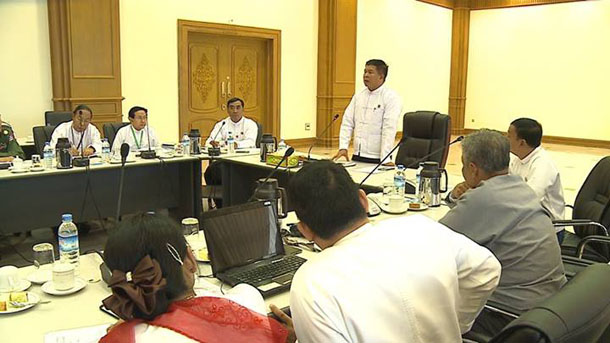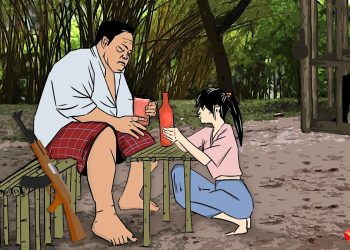The Union Solidarity and Development Party (USDP) and Aung San Suu Kyi’s opposition party have been holding a heated debate in recent days about the ruling party’s new plan to introduce a proportional representation voting system in the central regions of Burma.
Since June, both Suu Kyi’s National League for Democracy (NLD) and a number of ethnic minority parties, which together hold a small number of seats in Parliament, have fiercely opposed a USDP proposal to change the voting system ahead of the 2015 elections, which will be Burma’s first democratic vote in 25 years.
Under a proportional representation (PR) system, the number of seats won by each party is proportionate to the number of votes received. Under the current first-past-the-post (FPTP) system, the winning lawmaker in each constituency takes a seat to represent the whole area in Parliament.
In August, USPD lawmakers voted to set up the Lower House Electoral System Review Committee to study eight different electoral systems for Burma, including keeping the FPTP system, changing to PR and a mixture of the two voting systems.
Last week, the committee presented its findings and advised Parliament to introduce a mixed system whereby the ethnic states keep the FPTP system while the Burman-dominated central divisions would change to a PR voting system.
Burma’s ethnic states and the Naga self-administrated region represent about 126 of the total 330 constituencies in the country.
This week, dozens of opposition and ruling party lawmakers have been debating over the proposed change, with NLD members opposing changes to the voting system ahead of the 2015 general elections.
Khin San Hlaing, a NLD lawmaker from Pale Township constituency in Sagaing Division, said the USDP chairman of the committee had pushed through the proposal to change the voting system, even though the Burmese public would not understand the change and its political implications.
“Now there is little or no awareness. No information is provided to the public about the new electoral system [proposal]. That’s why we have been urging on behalf of our voters not to introduce it,” she told The Irrawaddy on Wednesday.
The NLD has adopted the position that the public should be consulted about the proposed change to the voting system through a referendum as it would represent a change to the Constitution.
“If Parliament decides to practice a new electoral system, a referendum would need to be held with over 75 percent of public support” for the change, Zaw Myint Maung, an NLD member who is on the Electoral System Review Committee, told Parliament, according to a post on the NLD’s Facebook page.
The USDP maintains the change to the voting system is not a constitutional change and that a public referendum is not required. USPD representatives could not be reached for comment on Wednesday.
The USDP lawmakers have made few attempts to publicly explain why Burma should switch to two voting systems ahead of the 2015 elections, and the initiative raises the question what the ruling party of ex-generals and the bloc of military MPs stand to gain from the change.
Aung Zin, a lawmaker with the National Democratic Force, a small party supporting the USDP, told The Irrawaddy last week that there was no need to consult the public on the changes, claiming that Parliament could decide.
Aung Zin, who is also committee member, said the proposal to change the voting system had the support of Union Parliament Speaker and USDP chairman Shwe Mann, adding, “The Speaker said more voting systems should be added to allow the MPs to have more discussions.”
Ethnic party representatives had previously opposed a switch to the PR system, but seemed more divided after a meeting with Shwe Mann, who promised them that the ethnic states would not be affected by any change to the voting system.
With the committee’s proposal outlining that the voting system change would not affect ethnic regions, opposition among ethnic MPs subsided and only a few spoke out in Parliament against the proposed switch in recent days.
Nang Say Awa, an ethnic Karen MP from the Phalon Sawaw Democratic Party said, “We already said that we prefer the FPTP and the Speaker [Shwe Mann] already supported it.”
NLD member Khin San Hlaing warned, however, that the USDP’s plan to introduce two voting systems in Burma ahead of the 2015 elections was a ploy by the ruling party to divide the NLD and the country’s different ethnic regions so that the USDP could make political gains.
“Practicing different electoral systems would lead to more division amongst the highland and remote ethnic states, and other regions,” she said. Khin San Hlaing added that it was unclear whether Shwe Mann would put the proposed change to Burma’s electoral system to a vote in Parliament soon.

















